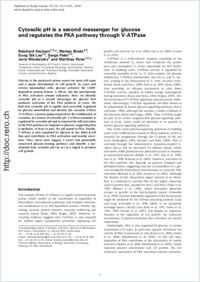Cytosolic pH is a second messenger for glucose and regulates the PKA pathway through V-ATPase
- Dechant, Reinhard Institute of Biochemistry, ETH Zurich, Switzerland - Competence Center for Systems Physiology and Metabolic Diseases, Zurich, Switzerland
- Binda, Matteo Functional Biology, Katholieke Universiteit Leuven, Belgium - Department of Biology, University of Fribourg, Switzerland
- Lee, Sung Sik Institute of Biochemistry, ETH Zurich, Switzerland - Competence Center for Systems Physiology and Metabolic Diseases, Zurich, Switzerland
- Pelet, Serge Institute of Biochemistry, ETH Zurich, Switzerland - Competence Center for Systems Physiology and Metabolic Diseases, Zurich, Switzerland
- Winderickx, Joris Functional Biology, Katholieke Universiteit Leuven, Belgium
- Peter, Matthias Institute of Biochemistry, ETH Zurich, Switzerland - Competence Center for Systems Physiology and Metabolic Diseases, Zurich, Switzerland
-
25.06.2010
Published in:
- Embo Journal. - 2010, vol. 29, no. 15, p. 2515-2526
English
Glucose is the preferred carbon source for most cell types and a major determinant of cell growth. In yeast and certain mammalian cells, glucose activates the cAMP-dependent protein kinase A (PKA), but the mechanisms of PKA activation remain unknown. Here, we identify cytosolic pH as a second messenger for glucose that mediates activation of the PKA pathway in yeast. We find that cytosolic pH is rapidly and reversibly regulated by glucose metabolism and identify the vacuolar ATPase (V-ATPase), a proton pump required for the acidification of vacuoles, as a sensor of cytosolic pH. V-ATPase assembly is regulated by cytosolic pH and is required for full activation of the PKA pathway in response to glucose, suggesting that it mediates, at least in part, the pH signal to PKA. Finally, V-ATPase is also regulated by glucose in the Min6 β-cell line and contributes to PKA activation and insulin secretion. Thus, these data suggest a novel and potentially conserved glucose-sensing pathway and identify a mechanism how cytosolic pH can act as a signal to promote cell growth.
- Faculty
- Faculté des sciences et de médecine
- Department
- Département de Biologie
- Language
-
- English
- Classification
- Biological sciences
- License
-
License undefined
- Identifiers
-
- RERO DOC 20242
- DOI 10.1038/emboj.2010.138
- Persistent URL
- https://folia.unifr.ch/unifr/documents/301755
Statistics
Document views: 165
File downloads:
- pdf: 290
